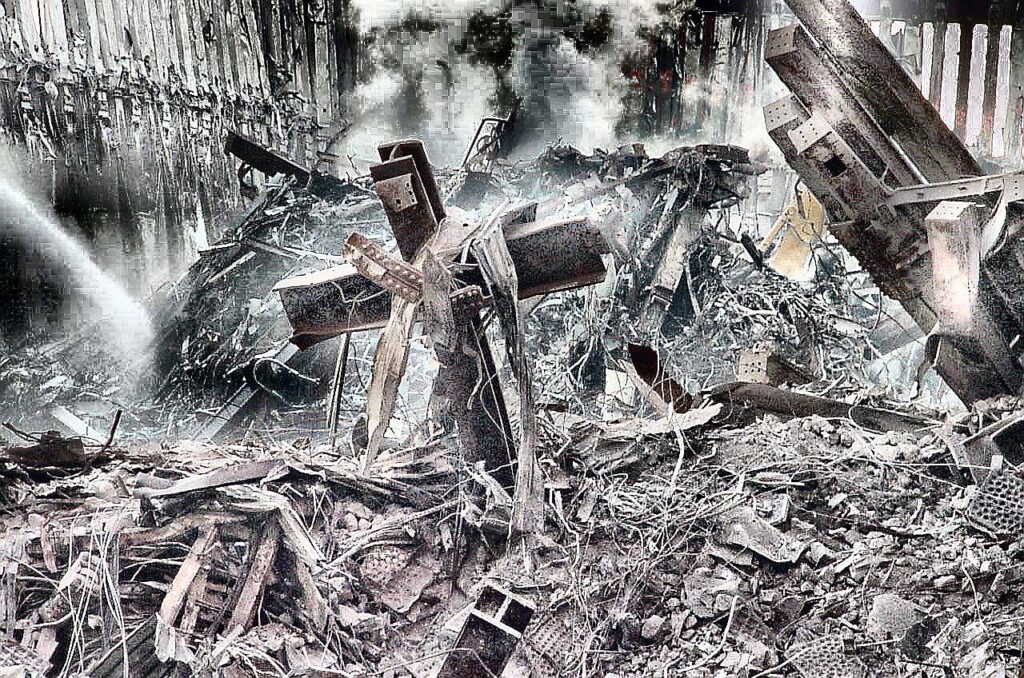In memorium:

As we approach the twentieth anniversary of the terrorist attacks of September 11th, 2001 news outlets, internet pundits, and all manner of social media will likely be filled with retrospectives from every conceivable angle telling us the significance of the events of that day as well as those 7,300 plus days since. Recently, the withdrawal of US and allied forces and the resulting fall of the corrupt government of Afghanistan to the Taliban seems to have brought these past two decades full circle, absent Osama Bin Laden and the tens of thousands of others, combatants and civilians, who have died in the wars that followed 9/11/2001. The rippling waves of suffering emanating from that day have touched many more than those who have died. Maimed in body and soul, these living carry the scars from unimaginable violence. The car bombing of a girl’s high school in Kabul only a few months ago killing at least 50 and wounding over a 100 or the suicide bombing of those recently attempting to escape Kabul during the US withdrawal, killing over a hundred including 13 American service members, is emblematic of such indiscriminate bloodshed. The reader may know of someone who died or was injured in the attacks of 9/11 or in the wars that followed. The initial shock, anger, and sadness when learning the news attenuates over time but leaves the scar of loss in the empty spaces where the lives lost once lived. To that place of mourning our thoughts readily return when the calendar inexorably makes its annual visit to the date marking the anniversary.
In the intervening years the phrase “the world has changed” has gained ever new, and more apocalyptic meaning. Certainly, we knew of ‘climate change’ before 9/11 but the increasing urgency and shrill warnings from all levels of academia and society have made the monitoring of every change in the weather something more than a topic exchanged as a pleasantry between neighbors. The technological revolution of personal computers and the internet had already begun before the current millennium. Yet the iPhone would not be introduced until 2007. And with the coming of the smart phone followed the now indispensable ‘apps’ that allow us, upon checking the requisite box (where we give up our personal information), to navigate both real world roadways and the virtual/digital world overseen by increasingly pervasive and authoritarian social media titans. And then there is the Covid-19 pandemic which has pulled the rug out from under every aspect of life amid lock downs, social distancing, mask mandates, and quarantines. The ever-changing virus having wrought worldwide sickness and death seems only intermittently and reluctantly to be curbed by medical and social strategies developed to halt its spread.
Amidst this changed world the violence common among the varied Islamist terrorist groups that perpetrated the attacks of 9/11 has spread like a virus around the globe. In the epilogue of René Girard’s last book, Battling to the End, there is a discussion of this new situation:
Today’s terrorism is new, even from an Islamic point of view. It is a modern effort to counter the most powerful and refined tool of the Western world: technology. It counters technology in a way that we do not understand, and that classical Islam may not understand either…For us, it makes no sense to be ready to pay with one’s life for the pleasure of seeing the other die.
The head of Hezbollah, Hassan Nassrallah, has been quoted as repeating a theme used by Islamic jihadists since the 7th century, “We will win because we love death as much as you love life.” The outworking of this death cult is seen not only in the 9/11 attacks but in, suicide bombings, Gazan rocket launchings from the roofs of schools and hospitals, and children used as human shields by Boko Haram.
It was Girard’s mimetic theory which first described how the potentially catastrophic intraspecific violence of early hominid groups, no longer ruled by instinctive dominance and submission patterns, became the source of the all-against-one scapegoating mechanism. And this, he theorized, eventually led to an inchoate image of the scapegoat victim as a powerful bringer of peace to the community through the victim’s sacrificial death, and thus the origin of primitive sacrificial religion. While none of this was a conscious development, it did follow what might be called a natural path. For creatures who, made in the image of their creator, forsaking their creator’s only injunction claimed autonomy for themselves and became resentful of all authority. These early human groups and societies experienced the blessings of a peace that would be renewed with episodic spasms of sanctioned sacrificial violence that proved efficient and economical – “It is better that one die, than the whole people be destroyed”. However, Girard recognized that with the advent of the Hebrew prophets and the revelation of the innocence of these victims witnessed in the Passion of Christ, the reconciling effects of scapegoating violence was being undermined. Now, through the globalized exposure to the West’s Gospel induced empathy for victims our world is losing the benefit of the community restoring powers of sacrificial violence.
Today the resentments and animosities that build up within societies are vented in increasingly random episodes of mob violence that never achieve a socially effective catharsis. Currently only totalitarian surveillance states seem to have a handle on suppressing this random violence by means of the more covert and insidious violence of mass manipulation and coercive social control strategies. In the economically advanced democratic/free-market/therapeutic West, when we’re not attempting to scapegoat our social/political rivals, we seem to be trying our best to either medicate our anxieties or amuse ourselves with virtual reality games and entertainments that are often hyper-violent themselves.
As we relax on this Labor Day weekend ahead of the 9/11 anniversary while gazing at the scrolling screens of our smart phones or zoned out with the latest legalized recreational substance the many tens of thousands of abandoned military weapons left on the ground in Afghanistan will be made available to jihadist terrorists around the world. The coming days, months, and years will no doubt see these lethal devices photographed in the hands of mujahideen as they spread mass mayhem where opportunity avails. In a kind of homage to the ‘defund the police’ mantra of our own 2020 summer of violence the president has declared that the US will no longer be the world’s police force. We are told, and it was true, that the US war in Afghanistan was not a ‘popular’ war. (What a romantic notion that phrase reflects, ‘popular’ war.) So, now, having been chased out of Afghanistan, are we no longer ‘at war’?
Our terrorist adversaries, who love death more than we love life, know we will do anything to not be responsible for the death of innocent victims even as they multiply the body count with every new atrocity. In a 2008 essay in Harvard Law Today, Professor Alan Dershowitz quotes former Israeli Prime Minister Golda Meir regarding Palestinian terrorists, “We can perhaps someday forgive you for killing our children, but we cannot forgive you for making us kill your children.”
We seem to be coming to the end of a race between the effects of the Gospel and message of the Gospel. For over two thousand years the Gospel has been undermining our species’ ability to come together around the dead bodies of our immolated scapegoats with awe and wonder as we enjoy the peace and camaraderie produced by our deep collective desire for the victim’s elimination. Perhaps because we have become inured to the Gospel’s message, it’s offer of forgiveness of sin upon the recognition of who Jesus Christ is – like the thief on the cross – has so far not produced a vibrant culture of self-sacrifice needed to avoid an apocalyptic ending. The conversion that leads to repentance and transformed lives does not happen overnight. It is the work of lifetimes that must be passed on from generation to generation in the traditions and cultures that honor and nourish the source of salvation with works of self-sacrifice; lives now made supple to the Gospel’s law of love. If we do not strive to live by the commandments to love the Lord our God with all our heart, soul, mind, and strength, and our neighbor as our self, it may not be possible to live peaceably in this world at all.
The images of that day when terrorists flew loaded commercial passenger planes into the twin towers of the World Trade Center in the heart of New York City, and into the Pentagon, and into a field in Shanksville, Pennsylvania, is seared into our collective memories. As we pray for the souls of those killed and healing for those maimed, we should also remember to pray for ourselves, our families, and our communities that the violence which continues to inflict death and suffering in the name of Islamist jihad not be the last word in a story of vengeance. Jesus Christ will be the last Word as He is the first Word.

